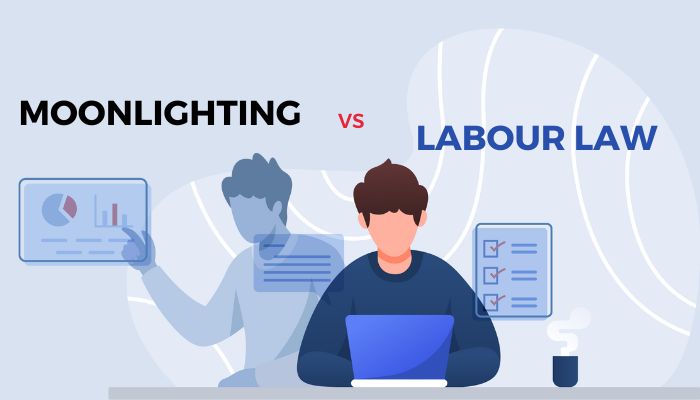Moonlighting refers to holding a second job outside of normal working hours or taking up second or additional jobs, besides an individual’s main employment.
To understand the legality of moonlighting in India, we may have to see the related provisions provided in the “Constitution of India” followed by enactment of certain state laws and are as follows:
>> Constitution of India:-
Article 19 defines the “Right to Freedom” as one of the Fundamental Right and Article (1) (g) of the Constitution of India provides as follows:-
“Right to practice any profession or to carry on any occupation, trade or business” to all citizens subject to below mentioned exceptions:-
(i) Nothing in sub-clause (g) of the said clause shall affect the operation of any existing law in so far as it imposes, or prevent the State from making any law imposing, in the interests of the general public, reasonable restrictions on the exercise of the right conferred by the said sub-clause, and, in particular, 2 nothing in the said sub-clause shall affect the operation of any existing law in so far as it relates to, or prevent the State from making any law relating to,—
(ii) the professional or technical qualifications necessary for practicing any profession or carrying on any occupation, trade or business, or
(iii) the carrying on by the State, or by a corporation owned or controlled by the State, of any trade, business, industry or service, whether to the exclusion, complete or partial, of citizens or otherwise.
Basis the power conferred by the Constitution of India, some states have framed adequate provisions under certain legislations governing the restrictions on double employment, wherein a glimpse of the same is as under:-
>> Factories Act, 1948
Section 60 of The Factories Act, 1948 stipulates “Restrictions on Double Employment”, wherein no worker is allowed to work in any factory on any day on which he has already been working in any other factory.
>> Delhi Shops and Establishments Act, 1954
Section 9 of the Act stipulates “Restrictions on Double Employment”, wherein no person is allowed to work about the business of an establishment or two or more establishments or an establishment and a factory in excess of the period during which he may be lawfully employed under this Act.
>> Telangana Shops and Establishments Act, 1988
Section 69 of the Act stipulates “Restrictions on Double Employment”, wherein no employee shall work in any establishment nor any employer shall knowingly permit an employee to work in any establishment on a day or part of a day on which the employee is given a holiday or is on leave in accordance with the provisions of this Act.
>> Puducherry Shops & Establishments Act, 1964
Section 17-A of the Act stipulates “Restrictions on Double Employment”, wherein no person shall work about the business of an establishment or two or more establishments or an establishment and factory in excess of the period during which he may be lawfully employed under this Act.
>> Assam Shops & Establishments Rules, 1976
Rule 7 stipulates “Restrictions on Double Employment”, wherein no employee shall work in any establishment, nor shall any employer knowingly permit an employee to work in any establishment, on a day on which the employee is given a holiday or is on leave in accordance with the provisions of the Act and these Rules.
Similarly, states like Goa, Andhra Pradesh, Mizoram, Meghalaya and Union Territories of Jammu & Kashmir, Ladakh, Daman & Diu and Dadra and Nagar Haveli has prescribed under their respective Shops & Establishments Act / Rules, adequate provision on the restriction on double employment.
>> Industrial Employment (Standing Orders) Rules, 1946
Further, Section 8 of Schedule I-B 5of the Rules, prescribes that a workman shall not at any time work against the interest of the industrial establishment in which he is employed and shall not take any employment in addition to his job in the establishment, which may adversely affect the interest of his employer.
>> Appointment Order
Almost across businesses, appointment order entails negative covenants restricting the employee from engaging in a double employment, being also a ground for termination of employment.
CASE LAWS:
There are certain significant judgments by various High Courts in India, which have reiterated and reinforced the importance of Appointment Order / Contract, in terms of having such a restriction on double employment.
1.Gulbahar Vs. Presiding Officer (2015) – Punjab & Haryana High Court
In this case, the Petitioner had raised an Industrial dispute by serving a demand notice challenging his termination. Whereas, the Respondent had averred that the Petitioner was engaged in a dual employment, as he was working in two institutions at the same time and therefore, the Petitioner was discharged from the services of the Respondent’s.
Considering the exhibits placed on records, proving that the Petitioner had received payment of salary from his other employment as well, the Punjab and Haryana High Court has upheld the contention of the Respondent and justified the termination of the Petitioner on grounds of dual employment.
2. M. Neelakandan Vs. The Presiding Officer (2012) – Madras High Court
This case revolves around the Petitioner being engaged in a vocation outside that of the Company, without its written permission and having worked against the interests of the company.
The Madras High Court in this case, has clearly stated that dual employment amounts to misconduct and any person acting dishonestly to the Company’s business or acting against the interests of the company, while being engaged in another employment, construes an act of serious “misconduct”.
CONCLUSION:
The concept of double / dual employment is still ambiguous in our legal system; however, as stated above, “The Constitution of India” empowers the States to formulate and govern the provisions on dual employment or so called moonlighting.
Source: TeamLease HRtech, Digitalising Employee Experience
You might also be interested to read: Is Marriage a Criterion for Maternity Benefit?






